Janice Hardy's Blog, page 24
April 26, 2021
Why You Should Know Who Your Narrator Is Talking To
 By Janice Hardy, @Janice_Hardy
By Janice Hardy, @Janice_Hardy Your narrator has a bigger impact on the novel than you think.
Every story has a narrator–some narrators are the protagonist, others tell the tale as a group, and some lurk in the shadows or hover above the story like an all-seeing-eye. Sometimes we’re in someone’s head like an imaginary friend, other times we’re a fly on the wall. Whichever point-of-view style a writer chooses, it’s pointing at someone.
In grand terms, that someone is the reader, but it can be more subtle than that. Some novels break the fourth wall and address the reader directly, while others have their characters exist in a world that feels as if we’re watching it on closed-circuit TV.
Continue ReadingWritten by Janice Hardy. Fiction-University.com
Published on April 26, 2021 03:00
April 24, 2021
WIP Diagnostic: Is This Working? A Closer Look at Piquing Reader Curiosity on Page One
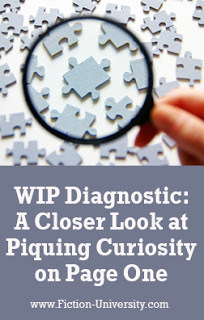 Critique by Maria D'Marco
Critique by Maria D'Marco WIP Diagnostics is a weekly column that studies a snippet of a work in progress for specific issues. Readers are encouraged to send in work with questions, and we diagnose it on the site. It’s part critique, part example, and designed to help the submitter as well as anyone else having a similar problem.
If you're interested in submitting to WIP Diagnostics, please check out these guidelines.
Submissions currently in the queue: None
Please Note: As of today, critique slots are open.
This week’s questions:
1. Does this opening work?
2. Would you turn the page?
Market/Genre: Psychological Fiction
On to the diagnosis…
Continue ReadingWritten by Janice Hardy. Fiction-University.com
Published on April 24, 2021 05:24
April 21, 2021
The Danger of Self-Rejection (And Tricks on How to Battle it)
 By Royaline Sing, @RoyalineSing
By Royaline Sing, @RoyalineSing Part of The Writer’s Life Series
JH: Sometimes, writers can be their own worst enemy. Royaline Sing shares her story of self-rejection, and how she overcame it to achieve her dream of publication.
Royaline’s first fiction work was a notebook length movie script, featuring her favorite stars. She was probably ten. It hasn't seen the light of the day (And it won't). But storytelling lingered. Now, she writes through the noise of lovely two kids, a very supportive (but sweetly clueless) husband and a bank job where numbers rule.
Born and brought up in India, she’s a huge fan of Bollywood romantic movies and likes all things Marvel. She loves to travel and has so many destinations on her bucket list: Scotland, London, Agra, you get the picture.
She writes Historical Romances, with heroines setting their own norms and coming to toes with heroes worth loving.
Website | Goodreads | Twitter | Instagram
Take it away Royaline…
Continue ReadingWritten by Janice Hardy. Fiction-University.com
Published on April 21, 2021 03:00
Building a Social Media Plan
 By Rochelle Melander, @WriteNowCoach
By Rochelle Melander, @WriteNowCoachPart of The Writer's Life Series
JH: Most authors would rather write than market, but social media is a useful way to connect with readers. Rochelle Melander shares tips on creating a social media plan you can live with--and maybe even enjoy.
Write Now! Coach Rochelle Melander is an author, certified professional coach, and teaching artist. She is the author of twelve books, including Level Up: Quests to Master Mindset, Overcome Procrastination and Increase Productivity; A Guide for Writers, Entrepreneurs, and Creatives . Through her writing and coaching, Rochelle Melander has helped thousands of people overcome writer’s block, design a writing life, turn their ideas into books, navigate the publishing world, and connect with readers through social media. Her debut book for children Mightier Than the Sword: Rebels, Reformers, and Revolutionaries Who Changed the World through Writing will be released in July. She interviews authors and publishing professionals on her Write Now! Coach blog.
Website | Goodreads | Facebook | Twitter | Instagram
Take it away Rochelle…
Continue ReadingWritten by Janice Hardy. Fiction-University.com
Published on April 21, 2021 03:00
April 20, 2021
Deconstructing Deadly Illusions—What Not to Do With Your Manuscript
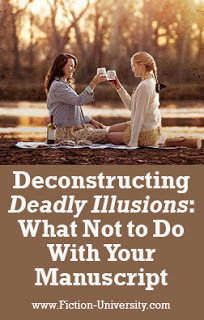 By Bonnie Randall
By Bonnie RandallPart of The How They Do It Series
JH: The smart writer learns from the mistakes of others. Bonnie Randall shares what went wrong with a story that made plenty of them, and how we can avoid those same mistakes.
Friends, because I’m a little salty these days, and because Netflix is a quadra-gajillion-earning empire (and therefore will not, in any way, suffer from this tiny hit piece), I decided to deconstruct one of their latest movies—a total stinkeroo called Deadly Illusions—in order to illustrate what not to do with your story.
So, if you’re prepared to hear a little snark, here we go:
Continue ReadingWritten by Janice Hardy. Fiction-University.com
Published on April 20, 2021 03:30
April 19, 2021
A Lousy Way to Create Conflict in Your Novel
 By Janice Hardy, @Janice_Hardy
By Janice Hardy, @Janice_Hardy Don’t take the easy way out when developing your plot.
I love conflict in stories, but not all conflict is created equal. There’s one type that really annoys me as a reader or a viewer.
Infighting.
Maybe I’m just a team player at heart, but I prefer a group of characters who work together to overcome problems. That “us against the world” attitude makes me cheer for them and I can’t wait to see how they deal with the next obstacle thrown their way.
But if they turn on each other and start bickering, or stabbing each other in the back, then I want to kick the whole lot to the curb. It’s hard to root for people who are being mean, petty, and selfish. Watching people fight is not my idea of enjoyment (though countless daytime talk shows says I might be in the minority here).
Continue ReadingWritten by Janice Hardy. Fiction-University.com
Published on April 19, 2021 03:00
April 17, 2021
WIP Diagnostic: Is This Working? A Closer Look at a MG Historical Opening Page
 Critique by Janice Hardy, @Janice_Hardy
Critique by Janice Hardy, @Janice_HardyWIP Diagnostics is a weekly column that studies a snippet of a work in progress for specific issues. Readers are encouraged to send in work with questions, and we diagnose it on the site. It’s part critique, part example, and designed to help the submitter as well as anyone else having a similar problem.
If you're interested in submitting to WIP Diagnostics, please check out these guidelines.
Submissions currently in the queue: One
Please Note: As of today, critique slots are booked through April 24.
This week’s questions:
1. Is this in his view point?
2. Does it sound like a 10-year-old boy?
3. Does this catch your attention and want to read more?
4. Am I showing or telling?
5. Does this beginning even come close to a “hook”?
6. How can I improve this beginning?
7. Do these sentences sound mechanical or do they flow with the story?
8. Did I mix his thoughts in with the narrative?
9. Would Freddy’s boredom come across to the reader?
Note: This is a resubmission. The previous versions are here: first, second, third, and fourth for those curious to see how this revision has developed.
Market/Genre: Historical Middle Grade
On to the diagnosis…
Continue ReadingWritten by Janice Hardy. Fiction-University.com
Published on April 17, 2021 06:29
April 15, 2021
How to Win Short Story Contests: Insights from A Writing Competition Judge
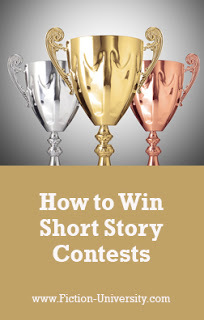 By Rayne Hall, @RayneHall
By Rayne Hall, @RayneHallPart of the Focus on Short Fiction Series
JH: Thinking about entering a short story contest? Rayne Hall shares tips on how to improve your chances at winning.
Contests are great for short story writers, because they motivate you to create more stories and to revise them until they sparkle like diamonds. If your story wins, you'll gain recognition, validation that your writing is good, a boost for your credentials. You may also reap a cash prize, and perhaps a certificate, trophy or plaque to display.
So how do you make your story stand out in the eyes of the contest judges?
Of course, you need to write a really good story. All the usual guidelines for story writing apply: character, goal, motivation, conflict, structure, dialogue, hook, satisfying ending and more. Unless you've mastered the craft of short story writing, your chances of success are small, and no insider tricks will help.
But here are several steps you can take to draw the judges' attention to your good story and win their favor.
Continue ReadingWritten by Janice Hardy. Fiction-University.com
Published on April 15, 2021 03:00
April 13, 2021
Why Self-Editing Your Novel Doesn't Really Work
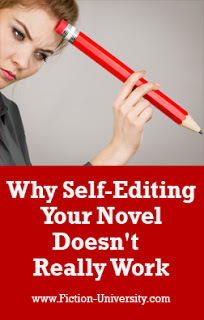 By Dario Ciriello, @Dario_Ciriello
By Dario Ciriello, @Dario_Ciriello Part of The Indie Author Series
JH: It takes a sharp eye to edit a novel, and familiarity with the work dulls that eye. Dario Ciriello shares why writers shouldn't rely on only themselves when editing their novel.
I once found myself reassuring an author on Twitter. The author had shown someone their final novel draft, which they’d gone through countless times, and the reader found a number of mistakes in just the first ten pages.
This isn’t in the least unusual. And although there’s currently a rash of books and blog posts on how to self-edit, the reality is that you’re not — unless you’re already a seasoned pro, and even then — going to catch the majority of issues with your own work. It’s impossible.
Continue ReadingWritten by Janice Hardy. Fiction-University.com
Published on April 13, 2021 03:31
April 12, 2021
Story Structure: How The Wrap Up Works in a Novel
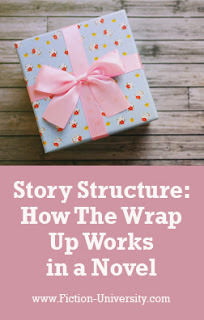 By Janice Hardy, @Janice_Hardy
By Janice Hardy, @Janice_Hardy The wrap up is the final goodbye for the novel, and your last chance to leave readers with a good impression.
There’s a series* I’ve read several times, because the wrap up has such an emotional punch that it pops into my head at least once a year and won’t leave. This is not a mega-bestselling series, and it’s not perfect. And while it’s fun, it also has issues and does plenty of things I could use as examples of what not to do in a novel.
Yet I keep reading it. And not just one book, but five. All to get to that ending.
It’s not the climax that gets me, though that’s exciting. In fact, the ramp up to the climax is also emotion-ladened and always makes me cry. It’s what the characters do in that final scene and why they do it that makes me come back to this series every year or two.
It’s heroic. And uplifting. And sad. And offers a sense that the world is a better, safer place now.
Continue ReadingWritten by Janice Hardy. Fiction-University.com
Published on April 12, 2021 04:45



